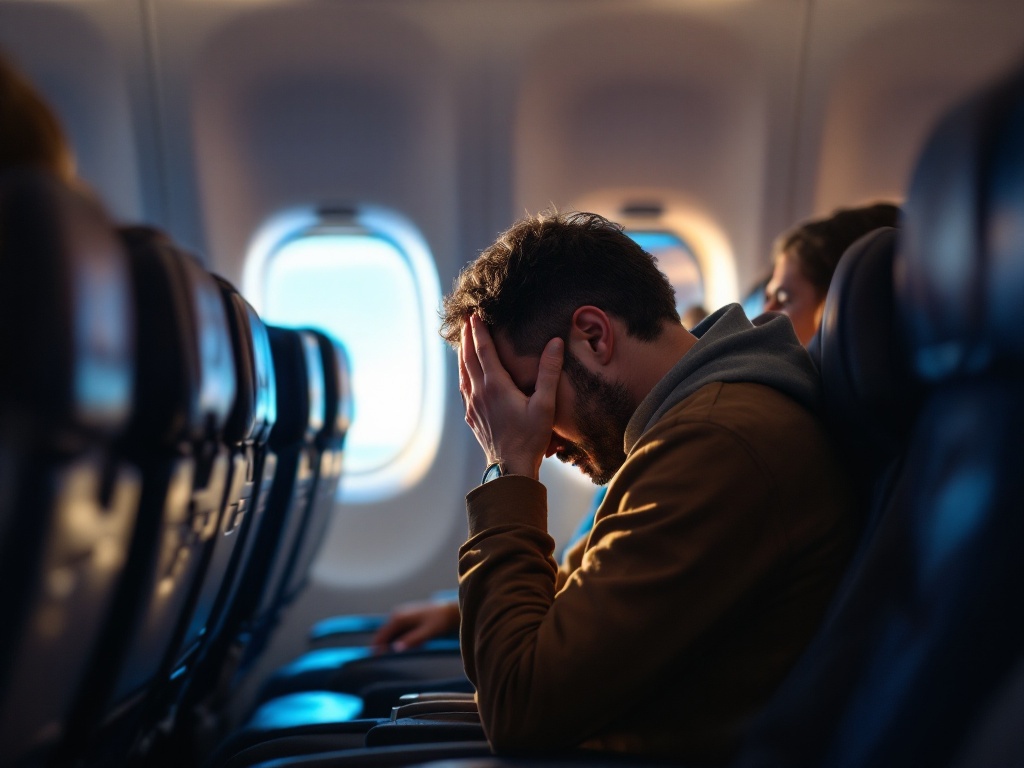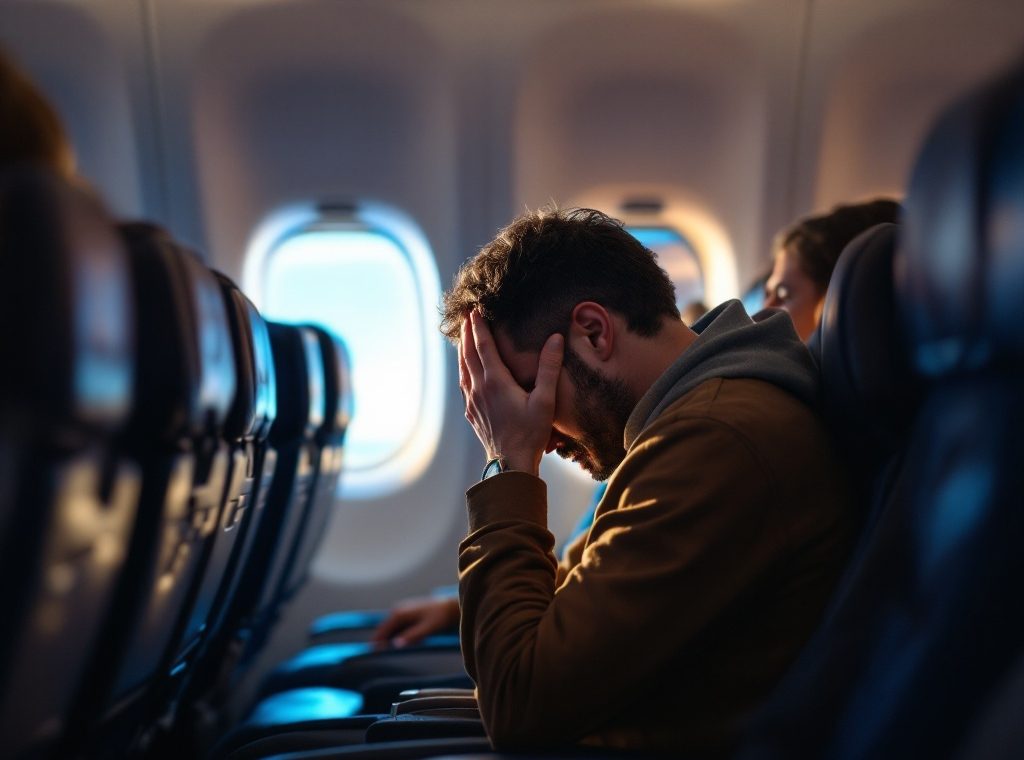Concussion and Air Travel: Recommendations
Experiencing lingering headaches or dizziness after a concussion? Air travel could worsen these symptoms due to cabin pressure changes. Discover the potential risks of flying with a concussion and learn how to prioritize your well-being. This article provides essential guidance on when air travel is generally safe post-concussion, the importance of consulting your doctor, and practical tips for a more comfortable flight. Ensure a safe and informed journey – read on before you fly.
Important information

- Cabin pressure changes during air travel can worsen concussion symptoms like headaches, dizziness, and fatigue.
- Always consult a doctor before flying after a concussion, especially if symptoms persist or the concussion was severe. They can assess your specific situation and advise on the safety of air travel.
- If you must fly, prioritize rest, hydration, and nutrition. Bring any prescribed medications and consider items like noise-canceling headphones and eye masks for comfort.
- For severe head injuries like skull fractures or brain bleeds, medical clearance is essential before flying due to potential risks like brain swelling and bleeding at high altitudes.
- Careful planning, including pre-booking transportation, informing travel companions, and packing essential items, can help manage concussion symptoms during travel.
Concussion and Air Travel: Is It Safe?
Flying after a concussion can worsen symptoms due to cabin pressure changes. Consult your doctor before flying, as air travel’s stress and disorientation can exacerbate concussion symptoms like headaches and dizziness.
Understanding the Risks of Flying with a Concussion
Air travel can be challenging for individuals recovering from concussions. Changes in cabin pressure can worsen symptoms like headaches and cognitive difficulties by increasing pressure within the skull. The stress of travel, combined with noise and bright lights, can also exacerbate these effects. If you’re recovering from a concussion, carefully consider the necessity of your trip and prioritize your well-being. Consult with your doctor before flying, especially if you’ve recently experienced a concussion. They can assess your specific situation and advise on whether air travel is safe for you. If you must fly, take steps to minimize discomfort. Consider noise-canceling headphones to reduce auditory stimulation and an eye mask to block out excess light. Stay hydrated by drinking plenty of water and take regular breaks to walk around the cabin when possible. These measures can help make your flight more comfortable and reduce the risk of exacerbating your concussion symptoms.
When Air Travel is Usually Safe Post-Concussion
Air travel is generally safe after a concussion, but only once symptoms like headaches or dizziness have subsided. Consulting a healthcare professional before flying is crucial, especially if symptoms linger. They may recommend waiting a few days to a week post-injury. For example, avoid flying if headaches persist and discuss your situation with your doctor. Flying prematurely could worsen your symptoms.
Consultation with a Doctor: Essential Precaution
Consult your doctor before flying after a concussion, especially a severe one, to ensure safe travels and informed decisions. They may recommend postponing your trip or advise on managing in-flight symptoms. For milder concussions, a doctor can confirm if flying is safe.
Understanding Air Travel After Mild Traumatic Brain Injury (mTBI)
Flying after a mild traumatic brain injury (mTBI) requires careful consideration due to the potential impact of altitude changes. Existing symptoms such as headaches, dizziness, and fatigue may worsen due to cabin pressure changes. Some individuals, however, might not experience any issues. Given this variability, consulting a doctor before flying is crucial for your safety.
Case-by-Case Basis for Air Travel Safety
Flying after a mild traumatic brain injury (mTBI) requires careful evaluation. Each individual’s experience and recovery vary, and factors like symptom severity and personal circumstances play a significant role in determining when air travel is safe. Therefore, decisions are made individually.
Symptoms of Post-Concussion Syndrome to Monitor
Key symptoms such as headaches, dizziness, nausea, and balance issues can indicate a problem. Also, be aware of sensitivity to light or sound. Cognitive difficulties, like memory or concentration problems, are additional important indicators. Postpone your trip if these worsen, and seek immediate medical attention if new symptoms develop.
Recommendations for Safe Air Travel After a Concussion
Prioritize rest before your flight to feel your best.
While traveling, stay hydrated and eat nutritious foods to maintain your energy.
Remember your prescribed medications and supplements, following your healthcare professional’s instructions for optimal health.
Planning Ahead: A Crucial Step
Traveling with a concussion requires careful preparation. Consult your doctor before flying to ensure it’s safe. Prioritize comfortable travel arrangements and anticipate potential challenges. Pack essential medications and items that can alleviate your symptoms, such as pain relievers and eye masks. Pre-book ground transportation and arrange for assistance if needed. Inform your travel companions about your condition so they can provide support. Careful planning will make your trip more manageable and help minimize your symptoms. Here’s a step-by-step guide to help you prepare:
Consult your doctor. Discuss your travel plans with your doctor to ensure flying is safe and obtain necessary medical clearance.
Prioritize comfort. Opt for comfortable travel arrangements, such as extra legroom seats or a direct flight to minimize discomfort.
Pack essential items. Pack essential medications, pain relievers, eye masks, earplugs, and any other items that can help alleviate your concussion symptoms.
Arrange transportation. Pre-book ground transportation and arrange for assistance at the airport or your destination if needed.
Inform your companions. Let your travel companions know about your concussion so they can provide support and assistance during the trip.
Rest and Recovery Before Your Flight
Prioritizing rest is crucial for managing concussion symptoms during air travel. Adequate sleep can significantly improve your comfort, contributing to a smoother flight.
Importance of Hydration and Nutrition
Recovering from a concussion requires proper hydration and nutrition. Drinking plenty of fluids helps your body function optimally, easing headaches and fatigue, which can be exacerbated by air travel. A balanced diet is also crucial, providing nutrients that fuel the body’s repair mechanisms and supply energy for healing, ultimately supporting overall recovery. Good choices include fruits, vegetables, and lean protein.
Hydration
Drinking plenty of fluids helps your body function optimally, easing headaches and fatigue often worsened by air travel.
Nutrition
A balanced diet provides essential nutrients that fuel the body’s repair mechanisms and supply energy for healing. Fruits, vegetables, and lean protein are excellent choices.
Continuing Medications and Supplements
Follow your prescribed medication and supplement regimen. Adhering to your doctor’s instructions is crucial for maintaining good health.
Special Considerations for Severe Cases
Flying after a serious head injury, such as a skull fracture or brain bleed, can be risky due to cabin pressure changes and the potential for brain swelling. Medical clearance is essential, particularly in severe cases. A doctor must evaluate the patient’s condition and potential flight risks before authorizing air travel to ensure passenger safety.
Flying After Major Head Trauma: Potential Dangers
Flying after a serious head injury can be risky due to cabin pressure changes, which may worsen existing symptoms or create new complications. The stress of travel can also hinder recovery. For instance, conditions like brain swelling or bleeding could become aggravated at high altitudes. Additionally, pressure changes can intensify headaches and dizziness. Therefore, consult your doctor before flying after head trauma. They can assess your individual circumstances and advise you on its safety. Here’s why you should consult your doctor:
Potential Risks
- Worsening of existing symptoms, such as headaches and dizziness.
- Development of new complications due to pressure changes.
- Aggravation of brain swelling or bleeding at high altitudes.
Doctor’s Consultation
Your doctor can:
- Assess your specific condition and the potential risks of flying.
- Advise on the safety of flying based on your individual circumstances.
- Provide recommendations for managing your symptoms during travel.
Importance of Medical Clearance for Severe Cases
After a serious head injury, consult your doctor before flying to assess any potential health risks related to air travel. This precaution ensures your fitness for the journey and promotes a safer flight.









